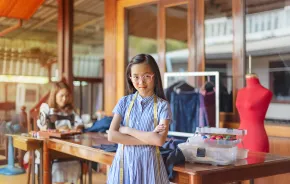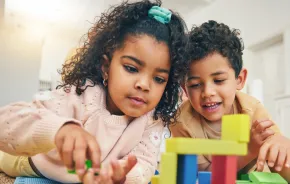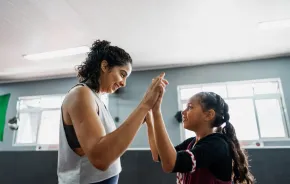 Paul Vine is an Eastside special-needs educator and the director of special education for the Lake Washington School District, which serves nearly 26,000 kids in Kirkland, Redmond and Sammamish, Wash. Under his purview: More than 3,000 kids with a wide range of disabilities, from ages 2 to 21 — nearly 13 percent of all kids in the district. To say that Vine is passionate about kids is an understatement; this thoughtful, bike-loving father of two has made his life’s work out of connecting with — and creating opportunities for — kids with special needs.
Paul Vine is an Eastside special-needs educator and the director of special education for the Lake Washington School District, which serves nearly 26,000 kids in Kirkland, Redmond and Sammamish, Wash. Under his purview: More than 3,000 kids with a wide range of disabilities, from ages 2 to 21 — nearly 13 percent of all kids in the district. To say that Vine is passionate about kids is an understatement; this thoughtful, bike-loving father of two has made his life’s work out of connecting with — and creating opportunities for — kids with special needs.
Describe your philosophy for educating special-needs kids.
Our philosophy is that every kid is a Lake Washington student first. Some may need some extra services to help them in their ability to access their education, but they are all our students.
We have a range of services, depending on the child, but we always start with their neighborhood school: Wherever they live, we try to provide the services there. Sometimes, kids have needs that are more significant, and it’s not always possible to meet their needs in their neighborhood school, but we try to do so when we can.
At the elementary level, K–5, we have what we call “learning centers,” which have more intensive services and a smaller staffing ratio. For older kids, all but two of our middle schools — and all of our high schools — offer a full range of services that can meet every kid’s needs. Our long-term goal is that all of our kids can stay within their neighborhood schools, with some rare exceptions. We want them to be in their own communities building those strong neighborhood relationships.
What range of abilities does your program serve?
We have a lot of kids who are getting special education but spend the majority of their day in regular classrooms, and then we have some that are in special programs the full day. Our kids range from having learning disabilities to disorders like attention deficit, to kids who are hard of hearing or deaf, kids with emotional and behavioral disabilities, kids on the autism spectrum, orthopedically impaired, medically fragile and more. It’s a lot of different, specific needs, but that’s part of the fun of it — you have a lot of variety and a lot of solutions available to meet kids’ needs.
One of our major focuses in education is inclusion: Every child belongs. We sometimes have an event called “Disability Day” — a day on which kids who don’t have a disability get to experience what it’s like to have one. For example, we’ll ask a child to try to read a book that just doesn’t make sense, so they can see what it’s like to not be able to read things. We just want to make sure that all kids are accepted and are part of the school community. And we see that this benefits all kids, those who have disabilities and those who do not. They all learn and grow from each other.
What support does your program offer to parents?
We have a special-needs group in our PTSA, and we try to have monthly meetings for parent education. We also have different advisory groups that work on specific issues, for instance, dyslexia. We try to create as many resources as possible for parents.
Tell us a bit about yourself.
I was a special education teacher, and then a special education director for seven years. But my first career was owning a bike shop in California. I still bike now, but not like I used to. I have a son who’s 10 and a daughter who’s 8. I always say that being a parent is one of the most rewarding things I’ve ever done — and one of the most relentless things I’ve ever done!
Where do you get your inspiration?
From knowing that the hard work we do together to try to make these kids successful is paying off. One of my favorite events of the year is the Transition Academy, which celebrates our 18 to 21 kids going out into the community and getting work. The kids run the whole graduation ceremony, and it’s really inspiring to think back to when they were in kindergarten, and then to where they are when they leave us at age 21. They are just amazing to watch, and see the growth, as they become independent adults in their own way.
What would you say to a parent whose child has just been diagnosed with a disability?
With any child, it’s a journey. Every child brings something to this world, and we have something to learn from each one. Just focus on knowing that children have different abilities — and not necessarily disabilities — and know that you are probably going to go through some grieving, but ultimately, if you can connect with parents who are going through the same thing, you realize you’re not alone.
I haven’t met a parent yet who — in the end — isn’t amazed at the things they’ve learned from their special-needs child.
Visit the Lake Washington School District to find links to local special-needs resources for families, as well as our articles and resources.










